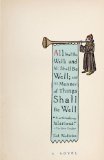Summary | Excerpt | Reading Guide | Reviews | Beyond the Book | Readalikes | Genres & Themes | Author Bio

Chapter One
Dawn, or its German equivalent, cannot be far off. But here, at the top of the
hill, night still clogs the forest. Being sixty-three years old and sleepy, I
find it nearly impossible to differentiate now between the stray grapevines, the
trees, and the waist-high shrubs that I know surround me. They could all be wild
animals.
'Is everyone awake?'
Three days ago I imprisoned six middle-aged women and one pre-pubescent girl in
a tent on this hilltop. The time has come to set them free.
'Pray undo the lock,' an anchorite whispers. Then, sensing my hesitation, 'Did
thou forget the key?'
There is no key because there is no lock. My hand waits on the zipper. I stand
there in my dagged-edged taffeta tunic, my sandaled feet wet from dew. My bald
little head. My nose. Somewhere behind me sleeps the great stone Benedictine
Abbey St Hildegard, its vineyards cascading down the hill over Eibingen, over
Rudesheim, and into the river Rhine.
Zipper down, the tent gives us Tivona Henry. Forty years old and not unlovely,
Tivona is skinny in a way that suggests intense concentration; more simian,
maybe, than outright undernourished. Her head feeds a nest of gray-streaked
frizz. It's Tivona's medieval chant workshop that I've accompanied on this
German vacation. She smiles.
I have only myself to blame. Weeks prior to the journey I'd sowed the idea of
re-enacting Hildegard von Bingen's first days in the anchorage, more or less on
a lark, knowing full well these women's anchorite longings and their propensity
for outlandish re-enactment schemes. I expected nothing to come of it. Then, a
day before departure, it was announced that several of the women would be
enduring three days in the tent; three entire days and nights atop the hill
overlooking the Abbey, reliving Hildegard's girlhood. One meal a day, only wine
to drink, no idle chatter, absolutely no grumbling; just chanting and the
occasional prayer. I have never had a problem with the concept of medieval
re-enactment. In fact, many believe that I actually invented it. The world is
riddled with far worse activities and I altogether refuse to even feign
embarrassment, especially at my age. Dressing up in period-specific costume? The
re-creation of history through practical workshops and group scholarship? For
some, in this day and age, there's simply no place left to retreat.
Tivona steps free from the tent. Others follow, one by one. Blinking, grinning
heads, then arms, then bodies. Tivona leading her cortege of part-time
anchorites back into the twentieth century. Each holds a candle made by the nuns
here at the Abbey St Hildegard, most ennobled with now-grotesque melting
effigies of their patron saint. White tunics glow in what is left of the moon.
Some stumble, others laugh; they are very obviously inebriated. They sing. Soon
I am surrounded, my flame-flickered face a mask of potent infirmities, adhering,
so I've been told, to the long tradition of Christian mysticism insisting that
those impaired in body are somehow healthier in spirit. Which is another way of
saying that because I am ugly I am going to get a reward. Specifically, I have a
misshapen nose.
There is a deep silence despite the amateur medieval plainchant which clouds
behind me. It's nearing lauds, first light. Single file, we begin our descent
back towards the Abbey and the event of our first public performance.
'Burt?' Tivona asks.
In three days the women will return home to Queens Falls, New York. They do not
yet know that I have no intention of accompanying them.
'Are you well, m'lord?' Tivona continues.
'No,' I say. 'I am not.'
Two years ago I joined Tivona Henry's medieval chant workshop as a way to better
manage the anger that New York State's Board of Parole believed they had good
reason to be wary of. Following a late-night Confraternity of Times Lost
Regained revel, I'd been apprehended while attempting to transport myself home
in a borrowed Saab. I didn't have a license to operate such a vehicle, or any
vehicle, or the requisite skills; and, worse, I'd consumed much homemade mead. I
really don't remember the specifics. It's a matter of public record, however,
that I altogether refused to walk in a straight line or touch my nose with my
finger. They'd never detained anybody dressed in period-specific, historically
accurate costume before, and once installed in the Queens Falls police depot I
was treated genially, like a time traveler who couldn't comprehend the vigorous
modernity which had enveloped him. Because I was old they supposed I was
demented.
Excerpted from All Shall Be Well; And All Shall Be Well; And All Manner of Things Shall Be Well by Tod Wodicka Copyright © 2008 by Tod Wodicka. Excerpted by permission of Pantheon, a division of Random House, Inc. All rights reserved. No part of this excerpt may be reproduced or reprinted without permission in writing from the publisher.




Any activity becomes creative when the doer cares about doing it right, or better.
Click Here to find out who said this, as well as discovering other famous literary quotes!
Your guide toexceptional books
BookBrowse seeks out and recommends the best in contemporary fiction and nonfiction—books that not only engage and entertain but also deepen our understanding of ourselves and the world around us.